Displaying items by tag: Peter Malone's Movie Reviews
My Sailor, My Love
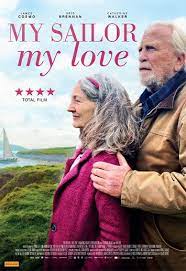
MY SAILOR, MY LOVE
Ireland/Finland, 2022, 103 minutes, Colour.
James Cosmo, Brid Brennan, Catherine Walker.
Directed by Klaus Haro.
Here is a drama that can be recommended for the older target audience, audiences who have many memories that they can draw on, happiness, regrets, unhappiness, hopes.
It is a co-production between Ireland and Finland, but with Irish characters and an Irish setting, the beauty of the County Mayo Coast and Islands, mostly overcast and cloudy, perhaps symbolic of the lives that the people lead.
At the centre of the film is an old sea captain, Howard, played by veteran character actor over the years, James Cosmo. He has retired but has many memories of his days at sea, sad memories of the death of his wife, abrupt and sometimes resentful of the care from his daughter, Grace (Catherine Walker). He does have two other sons but they turn up only for his birthday. He is gruff, self-contained, but, in some surprising moments, we see him telling fanciful adventure stories to the delight of some little girls of the family at the local pub.
So far, some identification with Howard, but wariness about him and his gruffness. His exasperated daughter arranges for a local woman, Annie (Brid Brennan) to come twice a week for housekeeping – and she is almost immediately ousted by Howard. We like Annie, her daughters working at the pub, the little grandchildren, and are pained when she is treated so badly. But, fortunately, Howard comes to his senses, get some flowers, comes to apologise to Annie who lets him know how hurt she is.
But, she does come back, Howard mellows (perhaps a bit too dramatically quickly for the film) but, it is a joy to see him come alive, share so much with Annie, she hearing his story and the death of his wife, he hearing her unhappy marriage and her husband’s death. We are very happy to see them both so joyful, sharing so much, he come alive again.
Parallel to this story is Grace’s own story, a marriage which is breaking, her going to therapy and not finding it helpful, her work at the hospital and her being fired, her paying attention to her father, employing Annie, and, perhaps to be expected but regrettably so, her bad reaction to finding the bond between Annie and her father, denouncing her father as a self-centred man in the past, suggesting that he is exploiting Annie.
All of us who have had sadness in the past in our lives will be caught in the emotional crossfire, empathising with one, emphasising with another, trying to understand what is going on.
We get to like Howard very much, even as we acknowledge his being away from his family at sea, even more so as the years passed, the teenage Grace looking after her mother, welcoming her father home, a sense of obligation to care for him in his age and health situation. And we get to like Annie, her joy in her experience of getting to know and love Howard.
So, here is a film that can be recommended to an older audience, no off-putting violence, sex, language, the film having a PG rating because of mature themes.
- An Irish story? Finland collaboration?
- A film for older audiences, identification with the characters, their situations, crises, regrets, loves, hopes?
- County Mayo, the coast, the Bay, the Ireland? Overcast, clouds? Atmosphere? The musical score?
- The focus on Howard, James Cosmo’s presence, his life as a sea captain, away from home, relationship with his wife, distance, reluctance to come home, the death of his wife, Grace, looking after her mother, waiting for her father, his having to retire, health, living alone, grumpy, crossword puzzles, Grace trying to care for him?
- Grace, her story, as a child, home from school, looking after her mother, her mother is drowning? A yearning for her father? His absences? Her marriage, the tensions, her mental state, illness, the support group, the other members, the therapy, the leader, Grace and her dissatisfaction, walking out? The tension with her husband, his further job, to go to Munich, the selling of the house, the visit of the estate agent, Grace and her resentment? Her work at the hospital, kindly with the patients? And needing time to care for her father? Her being fired? Getting the further job, with the other nurses? Her husband leaving, the empty house?
- Grace employing Annie, Annie and her age, her later telling her story, her aggressive husband and his death, her daughters, marriages, the grandchildren, Julie? Work at the hotel? Annie, agreeing to work for Howard, getting the bus, going to the house, preparing the meal, his treatment of her, to never darken his door again? Her being hurt?
- Howard, change of heart, the flowers, going to apologise to Annie, her reluctance? Howard and the grandchildren, telling the stories of the gorilla? The delighted response?
- Annie, her return, cooking the meal, Howard setting the place for her, eating together, his change of heart, inviting her to return? The return, cleaning the house, discovering the weaving machine and repairing it, his inviting her to stay, talking with her daughters, her coming, rearranging house, the photos of her family? Going for drives? The bond between them?
- Howard, the reason for his retirement, concealing it, his turn, the need for a checkup, his covering it over as blood pressure?
- Grace, arriving, the discovery, upset, the confrontation with the father, confrontation with grace, telling Annie that her father was completely self-centred? The contrast with his behaviour with Annie, the family, joyful in celebration, Grace upset?
- Annie leaving, Grace coming in wanting to stay, having now home, her father’s reaction?
- His collapse, hospital, the truth about his illness? Grace planning for him to be at home? Annie and the visit to the hospital? After keeping away? Grace at the hospital?
- Howard, the recuperation, and his visit, the proposal, the happiness?
- Howard’s death, and he with him, Grace’s reaction?
- Grace, coming to terms with her own life, deprivations, her attitude towards her father, love, need? The reconciliation with Annie?
Day and a Half, A
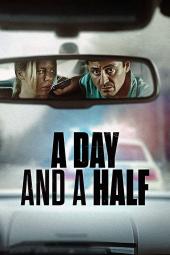
A DAY AND A HALF
Sweden, 2023, 94 minutes, Colour.
Alexej Manvelov, Alma Posti, Fares Fares.
Directed by Fares Fares.
This is a very interesting film on domestic violence, coming from Sweden, cowritten and directed by the Swedish actor, Fares Fares (born in Lebanon on but coming to Sweden with his family in his early years, a strong performance in Cairo Conspiracy). Fares also stars as the mediating policeman.
The day and a half of the title refers to a disturbed husband coming into a hospital to confront his wife, accusing her of infidelity, of taking his child from him. He creates a scene in the hospital, the police are called, he takes his wife hostage. This is a very strong beginning, the mad look of the husband, more revelations about his past and domestic violence, his infidelity with a Thai woman, his wife leaving him and sending their daughter to her parents.
The mediator is called in and he drives the couple, the husband pointing a gun always at his wife, first to her parents’ home to get the child, a violent confrontation with the racist father and condemning mother, then an attempt to get a plane to Albania from where the husband comes, then the possibility of a ferry to Poland.
Stories are revealed during the long journey, day and night, morning. The mediator, always in contact with the police, prefers to be a listener, suggestions, more gentle, telling his own story and his own failings – which does lead to a moving moment where the harassed husband offers his phone for the mediator to phone his young alienated son for his 13th birthday.
In many ways, the film is quite calm in its presentation of harsh and violent domestic troubles, the role of the mediator as a listener enabling the violent man possibly to become calm. And he is able to mediate some possibilities for forgiveness and reconciliation.
- The title, the timespan, the initial confrontation and abduction, the journey, the final resolution?
- The Swedish settings, the hospital, the police, on the road, the various landmarks, the different countrysides, near the airport, near the ferry? The musical score?
- The credibility of the plot, domestic violence, tensions in marriage, mental illness, infidelities, children?
- Lukas, the police, the mediator, his style of intervention, no weapons, friendly, not confrontative, engaging in conversation, enabling expression of feelings, making judgements to avoid violence, driving the car, contact with the other police, speaking frankly? Listening to the story, care for the wife? Eventually telling his own story, his limitations, infidelity, his son’s 13th birthday, the phone call? His psychological skills in dealing with Artan? Care for Louise? Taking the couple to Louise’s parents, getting the child, the interaction, the father’s racism, the violence? Eventually following the possibilities, the plane, government officials, the ferry? The issue of Artan and not being able to travel? Artan getting him to get the coffee, his standing and observing the finale? Looking at Artan, looking at Louise? A sympathetic character, with limitations, skills, and the tears after the phone call to his son?
- Artan and his story, Albanian migration, in Sweden, his marriage to Louise, the birth of the child and his devotion, his not understanding or appreciating Louise, her physical health, mental health, dominating, his infidelity with the Thai woman? His arrival of the hospital, his state of mind, emotions, demanding, the gun, the receptionist and her businesslike manner and his terrorising her, pushing her to the floor? The others in the waiting room? His not being able to wait, with his number?
- Louise, her story, work in the hospital, the pregnancy, after the birth, love for her daughter, her husband’s treatment, the fact that he had charges of violence against him, his infidelity, her taking the children to her parents?
- The gun, the situation, trying to escape from the hospital, the hostage situation, the phone calls, the police, Lukas arriving, his reaction to Lukas, keeping the gun always on his wife? The desperation, wanting a plane, his demands, Lukas seeming to agree with them, the phone calls, the continual contact with the police, Zzrtan hearing this? The car, the cloth at the back, the bystanders, the media, speculation?
- The long journey, the hours passing, Lucas driving, Louise at the back, always with the gun, Artan and his desperation, his eyes? The gradual unfolding of the story, Louise and her experience, point of view? Artan and his defence of himself?
- At her parents’ place, getting the child, tending it, the discussions with the father, his attitude towards Artan, Louise’s mother, even more severe, denouncing her daughter? The fight?
- The possibility of a flight? Permission granted? The possibility of the ferry to Poland? Moving towards the sea?
- The contingent of police following, the national group? The cyclist giving the food through the window?
- The discomfort of the trip, the cup for your own, hunger, tension?
- The arrival of the ferry, Artan giving Lukas the phone to phone his son, listening to the phone call, Lucas and his tears? Artan, the move taught surrender, emptying the gun, throwing it out the window? Telling Lucas to get the coffee?
- The final talking between Lucas and Artan, his getting out, the police swooping on him, taking him away?
- A dramatisation of contemporary domestic violence?
Offering, The
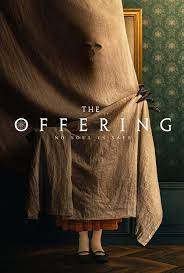
THE OFFERING
UK/US, 2022, 93 minutes, Colour.
Nick Blood, Emily Wiseman, Paul Kaye, Allan Corduner, Daniel Bens Zenou.
Directed by Oliver Park.
A small British horror film with a British cast, especially with veterans Paul Kaye (many episodes of Vera) and Allan Corduner (Sullivan in Mike Leigh's Topsy-Turvy).
However, the film was shot in Bulgaria and has a Brooklyn, New York setting. It also has a Jewish Orthodox setting which makes it seem more exotic than the regular horror films.
It opens very directly with an elderly Jewish gentleman subject to rituals, trying to be with his wife, a demonic appearance. The main part of the story concerns the son of an older, and the blood, returning to Brooklyn and his father with his British wife, Emily Wiseman, not Jewish. The father, played by Alan Corduner, conducts autopsies – and there are sinister happenings with the examination of the old dead man’s corpse. There is also the sardonic assistant, played by Paul Kaye.
There are various nightmares, especially on the part of the wife, and appearance of the dead man’s wife confronting the British woman, mysterious appearances, ritual explanations and ceremonies, circles… As well is a financial difficult background though ultimately, not much is made of that.
And, contrary to anticipation, the ending of the film is very grim.
- A British horror film, the New York Brooklyn setting, filmed in Bulgaria, the British cast?
- The title, the opening sequence, the old man, the eerie room, his rituals, the death of his wife, daughter, wanting them back, the Circle, the signs, the appearance of the creature? His death, taken to the morgue?
- The Brooklyn settings, New York, the bridge, the river, the streets, the house, the Orthodox setting, rituals, prayer, gatherings? The morgue, autopsies, atmosphere? Musical score?
- The Orthodox setting, Jewish history, religion, rituals, leaders? Mythologies?
- The narrative, Arthur and Claire, returning from England, he returning home, American, she British, giving up her job, pregnant? Not Jewish? The background of financial dealings, the house, losing jobs? Saul welcoming them into the house?
- Saul, his leadership, autopsies, widower, at prayer, his rituals? Attitude towards his son? Welcoming – but others memories of the past and the severity of his father? Leaving home? Saul and his kindly attitudes towards Claire and her pregnancy?
- Arthur, the autopsy, the dead man, his story, disfigurements, atmosphere and its effect on Arthur?
- Heimish, his character, working with the autopsy, antagonism towards Arthur, his remarks, criticisms? Sardonic? His getting the message from Arthur’s financial adviser, denouncing Arthur, showing the message to Saul? Arthur, his reaction, Claire and her surprise, her being accused of complicity? Confrontation with her husband?
- The body, the odd happenings, his being infected? His father, with the body, and the sudden death of his father? Heimish, his help, calling in Chaim, his knowledge, information, and his death?
- The atmosphere, evil possession, demonic presence, the appearance of the girl, Claire seen her at the wake, behind the curtain, disappearing? Are appearing to Arthur? Claire, her nightmares?
- Arthur, more and more involved, Heimish and his help? The threats to Claire, the appearance of the old man’s wife, apparition, seeming real, ghostly, the threats to Claire under the table, Arthur trying to rescue, the repetition of the action?
- The final confrontation and build up? The evil presence, the threats – and the pessimistic ending?
Ego, the Michael Gudinski Story

EGO, THE MICHAEL GUDINSKI STORY
Australia, 2023, 111 minutes, Colour.
Directed by Paul Goldman.
This is a documentary about entrepreneur, Michael Gudinski, his presence in the music industry in Australia from the 1970s to his death in 2021. It has been directed by Paul Goldman (Suburban Mayhem, Footy Legends) who worked with Gudinski with many music videos. The documentary was in process, possibly for a several part television series, when Gudinski suddenly died in 2021 at the age of 68.
Clearly, this is a film for audiences who know the music industry and/or want to know more about its vitality for over half a century. But, this is also a film for those who may not have a major interest in the music industry. It is a very interesting portrait of an Australian, an enthusiastic personality, significant in his entrepreneurial field, successes, failures, achievement. It is also an interesting film for audiences considering Australian culture over this period, what Australia was like in the 1970s, the influences in the 1980s, an intervention by Rupert Murdoch in the 1990s, the shift from record production and sales to social media and availability of product – the very interesting coda of Gudinski’s activity even during Covid lockdowns.
Paul Goldman and the editor keep the documentary moving. Fortunately, there is a great deal of footage available from the past and many witnesses from that period – and the director using the device of showing the interviewee in the present alongside photos and footage from the past. And, many of them, including Gudinski himself, have changed a great deal (to say the least)! So, there is a wide range of talking heads during the film, production associates and business partners, and, of course, members of the various groups, Ross Symons and Skyhooks from the 70s, Tim and Neil Finn from Split Enz, longtime friendship with Jimmy Barnes, Paul Kelly, then the strong bond with Kylie Minogue, and in more recent times, rather surprisingly, a cheery personal friendship with Ed Sheeran. There are significant interviews with John Farnham, Sting, Bruce Springsteen, Dave Grohl and different band groups. Significant is his contribution to promoting indigenous music, Archie Roach and Yothu Yindi.
So, what Australia looked and sounded like in the 1970s, brash, new styles of music, production, groups, bands, tours, behind-the-scenes. Then, great success in the 1980s, moving worldwide, the US, less so in the UK, awards. And, as mentioned, in the 1990s, the encounter with Rupert Murdoch and the role of News Corp taking over Mushroom Records which Gudinski had founded and fostered with its talent for 20 years. The early part of the 21st century was rather lean in terms of success but, never put down, the 2010s saw all kinds of changes in Australian society and communication. Symbolic is his filling the MCG for an international concert at the time of the 2019 fires. And we can admire Gudinski’s enterprise in 2020 organising a media concert with so much talent to encourage people during lockdown.
Behind-the-scenes there is the continued support and love of his wife, Sue, their long marriage, good interviews with his daughter, Kate, and his son Matt who joined him successfully in his enterprises.
Seemingly extrovert off the page, exuberant, jovial, meeting people everywhere – but a variety of comments indicating some more thunderous moments, moods, business battles.
This is a significant documentary on Australian culture.
Biosphere
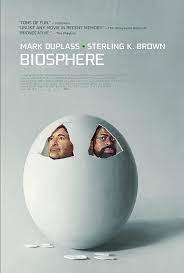
BIOSPHERE
US, 2023, 106 minutes, Colour.
Sterling K.Brown, Mark Duplass.
Directed by Mel Eslyn.
After watching Biosphere, audiences will have all kinds of conversations, all kinds of leads from this unexpected scenario. While reviews can be guides as to whether to see a film or not, many reviews are better read after the audience has seen the film. So, a suggestion that it might be best to see the film as it is rather than through the reviewer’s interpretation. That said, potential audiences alerted, here are some reviewer reflections.
Richard Matheson wrote an apocalyptic story, The Last Man on Earth (some film versions), touches of horror. Biosphere raises the question of The Last Two Men on Earth!
This is a science-fiction film. And all science-fiction films offer a variety of hypotheticals, scientific possibilities (and impossibilities), scenarios that range from the creation of life to space exploration. And, as with this one, they can be combined with apocalyptic possibilities, the end of the world. But, already these comments make Biosphere seem more seriously-toned than it is – though, ultimately, it raises all kinds of serious and depth questions. However, there is a comic and light tone throughout the film as we are introduced to a former President of the United States (obviously not one of the great statesman) and his science advisor who, in view of world destruction, has built a very comfortable pod for their survival, as many as the comforts of home as they can, help with them pass the years they have spent inside the pod. They have been friends since childhood, though he Republican and the scientist Democrat, and they share memories from their past, and banter through their survival, jogging, computer games, watching Lethal Weapon, experts on Super Mario…
So, while it has been apocalyptic, and there is a menacing greenlight outside the pod, this begins is a cheerful story about friendship, Sterling K.Brown, Ray, African-American scientist, intelligent, a reader, inquiring, contrasting with Mark Duplass, Billie, the rather affable layabout ex-president.
We are made alert because Billy starts to read Kiss of the Spider Woman, not understanding the gender issues the novel raises.
Then the screenplay moves to issues of evolution, the death of the male fish that they have been keeping, Sam, to mate with Diana, to keep them supplied with food. Diana dies. And the discovery of what can happen in this evolutionary situation for survival, Sam transforming to female. And, our immediate initial wondering: can this be true for humans and the prolonging of the human race. In fact, it does not take too long before this theme moves into action, Billy transforming, Ray puzzled, challenges the scientist to investigate. Which, of course, then leads to the issue of reproduction, pregnancy.
And the screenplay does take us all the way, challenging our ordinary stances, making us wonder about evolution and the future, and always the underlying contemporary questions about gender identity, gender relationships, love, the erotic, friendship…
The film takes place on the one set, rather claustrophobic in its way, is very much a dialogue-oriented screenplay, literature and media references, extensive vocabulary, which means that it offers an interesting, provocative, emotional and intelligent challenge.
- The title? Space? The enclosed pod? Life, survival?
- The tone of the film, comic, satiric, serious, science, evolution, gender, male-female…?
- The set, enclosed, the biosphere, main room, bedroom, the circuit for jogging, cooking, the library, television, computer games…?
- The audience gradually learning of the situation throughout the film, the past president, his science advisor, their friendship since childhood, different political affiliations, the responsibility of the president, destruction of the world, the building of the pod, a refuge?
- The character of Ray, African-American, science background, Democrat, advisor to the President, scientific investigations, building the pod? Strong masculine identity? The relationship with Billy, childhood, the presidency, the catastrophe, living the years in the pod, to bachelors, comforts?
- The character of Billy, as a child, friendship with Ray, audiences accepting him as President, the poster, soft character, accepting the situation, the years with Ray?
- The science fiction element? Hypotheticals? The apocalyptic scenario? Credible? The plausibility of the plot, survival?
- The issue with the fish, theories of evolution, the male transforming to female? Audiences anticipating the change with Ray and Billy? Billy proposing the theory? Ray’s response? The gradual transformation for Billy, genitals, the ceremony with the penis, the female transformation, vagina, breasts, the psychological transformation, female behaviour (stereotypical?) Sensitive, kitchen, language, treatment of Ray?
- The issue of pregnancy, the discussions about impregnation, discussions of reproduction, without erotic background, the final solution, the cover, the whole, Ray providing the semen, the effect on the two, the relationship, affection? The months of the pregnancy, the change in Billy, Ray and his responses? Setting up house?
- The mystery of the green light, his presence, eventually seeming to attack, the holes, the cloth, the container for the fish, the death of the fish? The prospects of starving?
- The question of whether there are other pods, other survivors? Coping with the crisis, the future, lack of food, the issue of bringing a child into this world?
- The sudden ending of the film, leaving everything to the audience to reflect on and discuss?
Past Lives
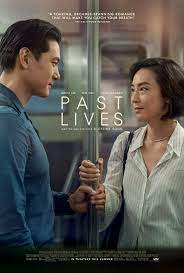
PAST LIVES
US, 2023, 105 minutes, Colour.
Greta Lee, Teo Yoo, John Magaro..
Directed by Celine Song.
It is said that writers should tell their own story. Playwright and director, Celine Song, draws on her own experience of her early years in Korea, her family migrating to Canada, her becoming a writer, marriage. But she enhances it with imagination, exploration of emotions, moments of communication, moments of silence.
There are several layers of meaning in the title, Past Lives. To else remembering their past and connections. However, there is an explanation of In-Yun (in-yuen) a Buddhist influence way of thinking, reincarnation, connections and past lives, bonding in the present, future connections.
Basically, the narrative takes place in three-time eras, opening in the present, going back 24 years, advancing 12 more years, coming back to the present. But the opening is tantalising, three adults at a bar, and a voice urging the audience to look at them, what the connections might be, the possible relationships. And the central character, Nora (Greta Lee) looks directly at camera. What are we thinking? What are we wondering? Who are these three?
The first part of the film takes place in Korea itself, and we are introduced to two 12 year olds, Na Young and Hae Sung, she always getting top marks, this time he beating her, and she crying in distress (something she often does). But, we see them as friends, playing together, their mothers having conversations – where will this lead? The immediate and sad answer is that her family is migrating to Canada. This moves him deeply. For her it is just part of life as she wishes him goodbye.
12 years later, Na Young has become Nora, a successful playwright, becoming very much a Korean North American in Canada. She attends a writing camp, meet writer, Arthur (John Magaro) and they bond. Meanwhile, Hae Sung(Teo Yoo) does his military service, rather unhappily, has a job, not satisfying, a girlfriend, but starts to look online for Na Young, not knowing she is Nora. When Nora he is about this, she makes a move and they have an online conversation, he devotedly remembering her and regretting her absence, she simply remembering a friend.
And then 12 years later again. Nora and Arthur are successful, he had a book launch signing, she writing plays, an apartment in New York City. And then Hae Sung decides to visit New York.
Celine handles this section of the film with great delicacy. The audience has got to know Nora very well and we wonder how this visit will affect her, friendship, affection, the presence of Hae Sung after 24 years. While the audience does know Arthur, we wonder how this visit will affect him and his love, his marriage. And what of Hae Sung, at this age, breaking with his girlfriend, wanting to see Nora again, devotion, rekindling love…?
In one sense, there is a great simplicity in the screenplay, the visit to New York, meeting, discoveries after 24 years, a tourist trip on the Hudson, a pasta meal at the bar. But, there is depth and complexity in the conversation at the bar, key to the whole film and the relationships, Nora between the two men, some speaking in English, some words in Korean, more and more Nora talking with Hae Sung, Arthur somewhat on the outer, but the conversation beautifully opening up Hae Sung’s devotion, Nora’s memories, her friendship and affection, her love for her American life, her love for her husband. And, while this conversation is dramatically telling – and she explains the conversation to Arthur, it is the final scene which so aptly and movingly bring this story to a conclusion, Nora accompanying Hae Sung to an Uber, their standing, silently, a distance between them, waiting for the car to arrive. And Nora returning to Arthur.
Great emotional exuberance – but profound emotional depth.
- The title, the past lives of Nora and Hae Sung, but the connections in past lives in terms of, Buddhist background, Korean interpretation, secular interpretation? Reincarnation?
- The autobiographical aspects of the narrative, the experience of the writer-director? Career, migration, Canada, New York, the literature and theatre world?
- In-Yun (in-yuen) and the Buddhist reflection, contacts in the past, contacts in the present, future contacts?
- The opening, the three people at the bar, the questioning, the possible relationships?
- Transition, 24 years earlier, school, Na Young and 80, the steps, talking, aged 12, her always getting top marks, his beating her in maths, her weeping? Their friendship, the play at the statue, their talk? The two mothers? The father and his filmmaking, home scenes? The decision to migrate? The two daughters, Na Young be unbecoming Nora? Saying goodbye, her friendship, but seemingly offhand, his deep feelings about her? Farewell, the plane trip, arriving in Canada, settling?
- 12 years later, Nora, her writing, theatre, at 24, relationship family, Internet connections, friends and career, discovering that he was looking for her, the contact, his motivations, missing her, memories of the past? Talking via computer, memories, the bonds, a change, his change, promising a visit?
- Nora, going to the writing school, meeting Arthur, working together, bonding? He and his military service, the glimpse, not happy? Flying to China? His friends, the drinking, girlfriend?
- 12 years later, Nora and Arthur in New York, his book signing, her theatrical writing? Married for many years, the apartment?
- Hae Sung, the plan to go to New York, letting Nora know? The flight, his arrival, the friends and the drink, storms and rain in New York?
- Arthur, his bond with Nora, learning some Korean, their shared interests and work? His reaction to the visit of Hae Sung? Nora and her reaction, meeting him at the airport, his settling in, his response, his love for Nora, the memories, the break with his girlfriend? His comment about earning money and supporting the wife?
- The tour of New York, the boat, the vistas of New York for the audience?
- The outing, his meeting Arthur, language, polite, loving pastor, the restaurant, sitting at the bar?
- The core of the film with the scene in the bar, talking, the two talking more and more in Korean, the depth of the conversation, the nature of love, of friendship? The exploration, Arthur patiently present? The conversation with Nora, her love for Arthur, the experience of meeting Hae Sung again?
- The next day, the farewell, the Uber, walking together, the long silence, the embrace, his departing? Her returning to Arthur?
Old Way, The
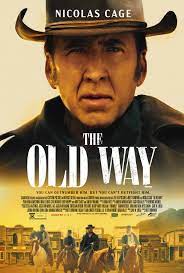
THE OLD WAY
US, 2023, 95 minutes, Colour.
Nicolas Cage, Ryan Keira Armstrong, Noah Le Gros, Nick Searcy, Kerry Kruppe, Clint Howard.
Directed by Brett Donowho.
Westerns seem to have found their place on television rather than on the big screen in the 21st-century. However, as the title suggests, here is a Western that reminds us of the old days, the old ways, including beautiful scenery in Montana, a musical score that is reminiscent of the classic scores of films like The Big Country.
The film opens with a lynching, a wealthy man accusing the victim of non-payment, townspeople crowding around, the son of the victim standing watching. But, also watching is a rather grim character, Briggs, played by Nicolas Cage. And the shooting starts, releasing the accused, the wealthy man shot, Nicolas Cage then taking money from the dead man, shooting those attacking him, shooting dead the father in front of his son.
Then a transition to 20 years later, Briggs now running a store, law and order in the town. He is married and has a young daughter, Brooke (a very strong performance on screen presence by Ryan Keira Armstrong). When a group of gunfighters arrive, we can guess that this is the son grown up and that he is bent on revenge, has served a prison sentence, has rounded up a group of associates, quite ruthless – confronting Briggs’s wife who puts up resistance, her horse killed from under her, her death.
As expected, the film turns into a vengeance pursuit, more complex because of the arrival of the sheriff and his associates, warning Briggs about the law, then caught in an ambush by the criminals and finally left by Briggs in the desert.
Of interest is the relationship between the gunfighter and his daughter (some commentators linking this theme with True Grit). As Briggs explains himself to his daughter, a harsh upbringing, minimal emotions, what we might call aspects of being on the spectrum. The scene of his explanations to his daughter as well as the daughter, very similar to her father, not crying, no grief… Is good strong drama.
And the film has its moments of suspense as to how Briggs will confront his enemies, the role that his daughter will play, and something of a high noon situation in the centre of the town. Not quite the ending we might have expected.
An interesting sequel would be to show what happens to Brooke when she is grown up.
- The title and expectations? A Western? Old stories? Old-style storytelling? For the 21st-century?
- Harsh West, hanging, gunfighters, the law, the changing West, more orderly, legislation, sheriffs? Revenge themes? The musical score, reminiscent of Elmer Burnstein et cetera? The beautiful backgrounds of Montana?
- The opening, the hanging, the taunting of the accused man, the wealthy accuser, the crowd, the little boy watching his father, the gunfighters, the accused cut down, the wealthy man shot?
- The presence of Briggs, silent, unemotional, the shootings, taking the money, being owed? The shooting of the father, the close-up of his son?
- 20 years later, Briggs, quiet, married, the relationship with Ruth, the relationship with Brooke, unemotional, walking his daughter to school, the teacher absent, her going to the store, his work, the long story about the outhouse from the customer (and Brooke later repeating it), stealing the jellybeans, her cleaning them and putting them in separate jars?
- Ruth, putting out the washing, the riders, the confrontation, her resistance, the attack, the house, the barn, riding out on the horse, the horse being shot, their taking her, killing her?
- The audience realising that the leader was the boy grown up, his accomplices, prison, their careers, robberies? The old man, Eustice, and the treatment? The young man and his relationship with the leader? They’re riding off?
- Briggs, walking home with Brooke, the discovery? The sheriff, his posse? Briggs and his not weeping? Brooke and her not weeping, the conversation with the sheriff about her sadness? Briggs burying his wife? The sheriff warning him against vengeance?
- Briggs, packing up, the temptation to kill Brooke, her looking at him? Giving her the rifle, the clothes, the horse, the pursuit, stops, short sleeps, getting water? Hearing the shots?
- The gang, the ambush for the sheriff and his men, the shooting? Briggs arriving, tying up the men, the sheriff and his warnings about the law? His tending to the bullet wound? Taking the horse, promising to leave it, not a horse thief?
- The gang, going to the town, in the saloon, Maria and looking after them? Placing each at the entry, the old man going to sleep, the boss’s treatment of him? the money, to spend it in Mexico? The packages with newspaper?
- Briggs and the plan, the long sequences of the father and daughter talking, insight into their characters, Briggs and his story, at home, emotionless, his way of surviving? A modern analysis – on the spectrum? His career, telling his daughter the truth, the encounter with Ruth, changing him, the store? Feelings of love? Brooke, the same, unable to weep, her father trying to coach her how to weep? Sending her into the town?
- The boss apprehending her, the group on the lookout for Briggs entering, the shooting? The discussions between the boss and Brooke, comparing fathers and fates?
- The buildup to the confrontation, a high noon in the street, the boss and holding Maria, the guns? The talk, the memories of what happened in the past? Briggs quick on the draw, Brooke and her quick action? Wounded, his daughter attending him? The death of the boss?
- The ways of the old west? Changing times? An interesting possibility for a sequel of Brooke in 10 years time…?
Fourmi/ Ol Love and Lies
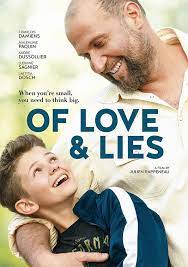
OF LOVE AND LIES/ FOURMI
France, 2019, 105 minutes, Colour.
François Damiens, Maleaume Paquin, Andre Dussollier, Ludivine Sagnier, Laetitia Dosch, Pierre Gomme.
Directed by Julien Rappeneau.
It is being complimentary, but it must be said that this is very nice film. It is the equivalent of a fairytale in contemporary life. And the focus is football.
We visit a small French town, especially the local football team for young boys, the sympathetic coach (veteran Andre Dussollier), the President of the club, sponsors, and the initial match where a young boy, Theo (a very engaging Maleaume Paquin), small but very effective during the play. And there are some scouts for British club, Arsenal, who have a talk with Theo praising him but saying he is too short to be recruited.
But, of course, all the adults assume that he is being recruited and are delighted. Theo hasn’t the heart to tell the truth, especially to tell his very boisterous, intruding on the field, erratic father, an alcoholic (a lively, sympathetic performance by Francois Damiens). His parents separated, his mother with her stepfather whom Theo does not relate well with. He wants to live with his father – and this gives the opportunity, his father eager to prepare him for going to England, eager to go with his son. So, plenty of room for comedy of errors.
Theo has some good friends in the town, confiding in one, but generally keeping his secret. But he does go to an eccentric friend, Max, an IT expert, who is able to manipulate emails allegedly from Arsenal, reports, results of interviews…
It all goes well enough for Theo except the burden of his not telling the truth. Ultimately, the truth will out. The scout comes back to watch the boys playing, the dismay of everyone concerned, the club president and his appeal for sponsors because of Theo’s talent, the coach and his assistant, but, especially, Theo’s father who has been helped by a busy social worker and has stopped drinking, but falls off the wagon, involved in a fight.
The friends help in their way, his father gives a lot of thought to the situation and meets his son, urging him to come back and play and the local club match – where, as in all good fairytales, Theo is able to kick a winning goal. And an invitation from Arsenal.
Plenty of happiness despite the deception – and a touch of tears.
- A contemporary fairytale? In real life? In wishful hoping?
- The setting, the French town, homes, school, football clubs, restaurants, social work? The football games? The musical score?
- Theo’s story, his age, his parents, the break, his alcoholic father, his devotion to him, his mother, marrying again, not liking his stepfather? His skill at football? Claude as coach, other members of the club, the boys? His skills? The talent scout for Arsenal, noting him, the conversation? Everybody assuming that he was chosen? His not wanting to disappoint his father? The love and the lies?
- The portrait of the Father, background, love for his son, separation, interactions with his wife, meetings with his son, their sharing, talking, the son wanting to live with him? His son wanting to please him? His enthusiasm, at the football matches, shouting and intruding, being barred? His zest with his son’s success, friends, drinking?
- Theo and his mother, the discussion with his stepfather and his firm stance?
- The social worker, her job, harassed, with Laurent, the discussions, her interventions, his pleading about court orders, the visits, the friendship, her exasperation, being fired?
- Theo and his friends, confiding in each other, the issue is not telling the truth? His friendship with Max, Max and his IT abilities, his interventions, rerouting letters, interviews…?
- Theo, his life, the discovery of the truth, the effect on everyone, his father and his disappointment, drinking, his parents, the friends, Romane and her disappointment? Staying by himself, not coming to the match, Claude and his support?
- His father searching for him, Romane and her help, their talk, his return to the match, the skills?
- The fairytale aspects, Max and his interventions, the talent scout coming again, talking, the Theo had grown taller, the contract? The happy ending?
- His father content, his mother going to England with Theo, hopes for the future?
Patient Zero/ 2018
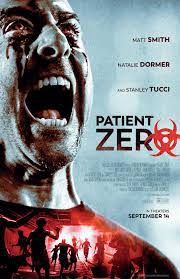
PATIENT ZERO
UK, 2018, 93 minutes, Colour.
Matt Smith, Stanley Tucci, Natalie Dormer, Clive Standen, Agyness Deyn.
Directed by Stefan Ruzowitzky.
The term Patient Zero emerged during the 1980s in the context of AIDS and the search for the origin of the spread of AIDS in North America. Which means that this title is initially misleading.
This time there is a world plague situation, originating in America’s midwest, a plague of rabies, the film initially indicating billions being infected. There is a parallel to the zombie infestation. However, the infection turns the humans into angry creatures, but still with their memories, able to communicate.
This is a British production, filmed in London, with a mainly British cast, but (perhaps for the wider American audience) set in the United States, with lead Matt Smith having to use an American accent.
While there are scenes of mayhem, crowd scenes, individual scenes, the rabid victims biting and infecting others, much of the action takes place in special and secret laboratories, militarily guarded, where doctors try to find an antidote. In charge is Dr Rose, played by Natalie Dormer. But the authorities are relying on the skills of Morgan, played by Matt Smith, who has been bitten but has not been infected to his detriment. He interrogates those infected, trying to find out where they came from, locating patient zero. He himself is sometimes angry and the interrogations, confronting the angers of the victims, playing music which torments them, erratic in his confrontations.
There are members of the staff, one cheerful member being bitten and having to be shot. The military official clashes with Dr Rose, eager to shoot those infected than help with any investigations.
At the centre of the investigation is the Professor, played by Stanley Tucci. He is not like the others, is not tormented by the music, and, while disfigured in his face, is able to explain his memories, philosophise about the nature of raging humanity, tell the story of his infection and his killing of his wife and daughter. He turns the tables on Morgan by explaining that those infected are looking to him as Patient Zero for their future.
There is some final mayhem, an escape sequence, Morgan helped by his infected wife who sacrifices herself – but, there is no definitive ending, all open-ended.
- A plague film? Rabies infection? Human transformation, rage? The parallel with the zombies?
- The American setting, yet a British production, the cast, Matt Smith and American accent? Credibility?
- The situation, the explanation, the search for an antidote, the search for patient zero to help determine the antidote? The isolation, the laboratories, protection, armed guards, the cages?
- The background, scenes of infection, mass scenes and rage, individuals in the cage, the treatment, communication with them, the physical effects, psychological effects, the torment of the music? The attacks, the biting, the military and the shootings?
- Morgan, his being bitten, not infected, his abilities with those infected, communicating with them, treatment, tactics, stand over tactics? The issue of his wife, in the cage, his love, support? His working with Dr Rose, collaboration, the sexual encounter, consequences?
- The attitude of the military, the commander and orders, Knox, brutal, confrontations with Dr Rose, the infection of the genial worker, the effect, seemingly saved, the break out, his being shot?
- The range of those interrogated, the past, their lives, explanations, attitudes?
- The professor, his personality, arrogance, the flashbacks to his life, the lectures, the phone call, the outbreak, the students, the attack on him, returning home, his wife reassured, finding the blood, his attack on her, his daughter, killing his family?
- His cold presence in the laboratory, the interrogations, his philosophising, about human nature, rage? His declaration that Morgan was really Patient Zero because he had survived despite the infection, and that those infected were looking to him to change them for the future?
- The confrontation with the professor, his death?
- The attack, Morgan and his decisions, Knox killed by Dr Rose, taking his wife, the warnings, his wife sacrificing herself? The escape with Dr Rose?
- The unfinished ending? Speculation as to the future of the human race?
Summer Days, Summer Nights/ Summertime
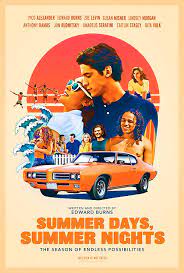
SUMMER DAYS, SUMMER NIGHTS/SUMMERTIME
US, 2018, 123 minutes, Colour.
Pico Alexander, Lindsay Morgan, Anthony Ramos, Amadeus Serafini, Caitlin Stasey, Rita Volk, Edward Burns, Zoe Levin.
Directed by Edward Burns.
For more than two decades, Edward Burns has contributed very personalised films, perspectives on ordinary American life (although opening up at times to a wider world, New York gangster world, for instance, Ash Wednesday). But, mostly, he focuses on families, family relationships, joy, tensions. And this is the case here.
We are in Long Island, Memorial Day, 1982, an opening which introduces us to a wide range of characters, lay teenagers, finishing high school, working for the summer, prospects for the future. No one really emerges as the centre except for JJ Flynn, played by Pico Alexander. He is an anchor with his own story, relationships, uncertainties, and his relationship with his father, played by Edward Burns.
Also in the cast is Anthony Ramos in an early role, later to emerge with In the Heights and Transformers, Rise of the Beast.
Very American, perhaps too American for wider audiences but eliciting some memories of now long ago decades.
- Memories of the 1980s? Summer? Memorial Day?
- Location, the town, the beach, homes, clubs, bars? The range of the musical score and memories of the 1980s?
- The films of Edward Burns, writing, directing, performing? Over decades, his porter of people, families, New York?
- The introduction, the range of characters, their age, high school, prospects, summer behaviour, relationships, questions? The teenage generation? The parent generation?
- The characters:
JJ, age, high school, leaving, prospects, meeting girls, the rich girlfriend, his other friends, confiding, talking, testing? His work, relationship with his father? Father’s advice?
Terry, the summer, music, composing, relationships, older?
Susie, personality, returning, relationship with Frankie, his relationships? Ups and downs and the relationship?
Miller, Lydia, outgoing, advice?
Debbie, relationship with Terry?
- The forthrightness of each of the characters, their emotions, on their sleeves, expressing them, audience sympathy, with younger audiences, with the parent generation? On older audiences looking back with memories?
- Work during the day, encounters, sexual relationships, tentative, forthright, exposing personalities, strengths, limitations? The block party? The fireworks?
- Edward Burns and his contribution to perspectives of Americana?